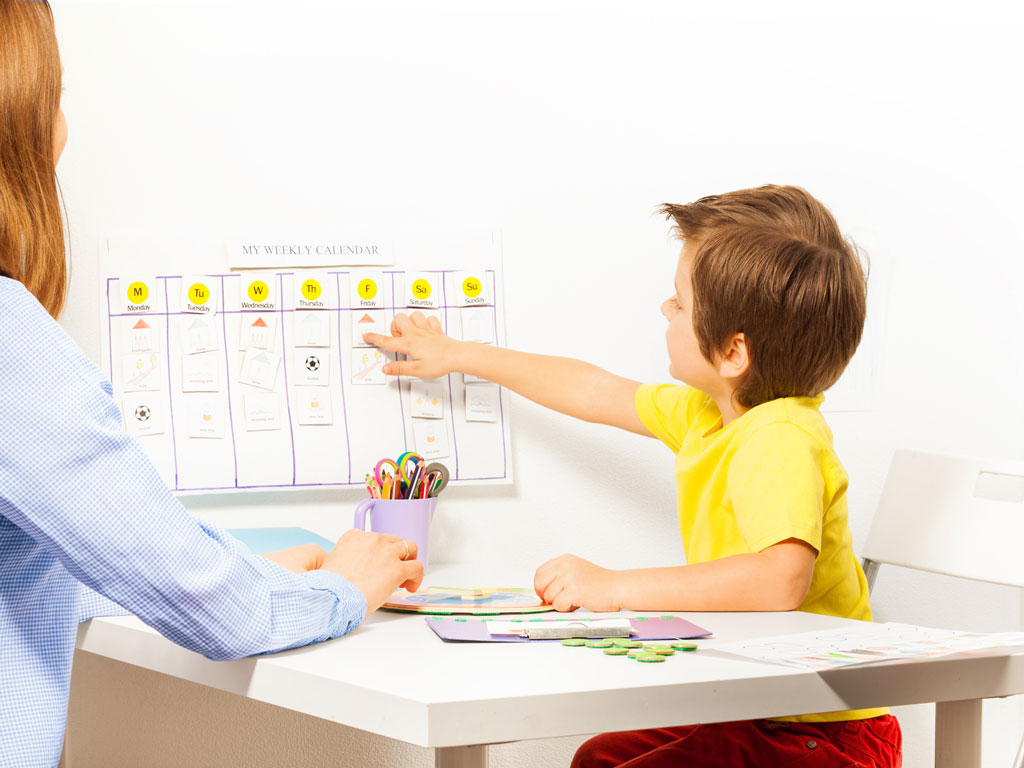by Karen K.C. Gibson
Every student, no matter how old, will succeed if they learn how to organize, how to manage their time and how to handle procrastination. Lack of any of these skills will lead to frustration, lack of motivation and possible failure. The earlier kids learn these skills, the easier it will be to implement successful study habits.
Organization skills teach students how to plan and do what it takes to complete assignments. Using checklists and planners help kids stay organized and avoid the stress of missing due dates or forgetting to prepare for exams. Weak organization skills make the learning process more challenging.

Simple tips include:
- Writing deadlines prior to the real deadline.
- De-cluttering weekly so old papers don’t get mixed up with current papers.
- Eliminate clutter in one’s personal space.
- Keep a neat work area with supplies nearby: pencils, calculator, laptop, paper, etc.
- Organize materials for each subject in a binder with dividers. (pockets preferable so loose papers can be stored)
- Color-coding each subject to locate materials and assignments quickly.
Working on one task at a time and avoiding multi-tasking will help with focusing. Multitasking reduces efficiency and performance since their brain can only focus on one thing at a time. When students try to do two things at once, their brain lacks the capacity to perform both tasks successfully. Research also shows that, in addition to slowing you down, multitasking lowers your IQ.
Children who use planners consider their time valuable and that completion of tasks are worth celebrating. Give them fun stickers to decorate and colored pens to mark off completed tasks. Older students can celebrate after each task is completed. Enjoy a favorite snack, take a 30-minute break to watch YouTube or watch their favorite show. Teaching kids how to manage their time will help them from engaging in time wasting activities as well as prevent procrastination.
Many students struggle from procrastination and sometimes miss deadlines. Breaking an assignment into manageable tasks is less overwhelming. Distractions can result in unnecessary delays. Creating time blocks where a student makes a commitment to complete a task before engaging in any fun is a tactic that can increase the chances of remaining productive. Many adults struggle with distractions, losing motivation or waiting for the right time to start. Whenever a student feels tempted to procrastinate, the best solution is start right away and commit to working at least 30 minutes before taking a brief break. Often after 30 minutes, a student gets into the study zone. Flow happens in the moment when a student feels like time vanishes and they basically forget about time. Increased productivity is the result of being in the flow.
Many students never learn how to study. If parents took the time to teach kids how to organize their materials, properly manage their time and how to overcome procrastination, academic stress would be reduced. Studying would no longer be dreaded, and students might actually learn to enjoy their academic journey. The secret is to introduce these skills at an early age. It’s never too late to implement time management skills.

Age Appropriate Tips
Ages 3 to 4:
Create a home for everything. Teach your child how to organize their things by knowing which drawers or plastic containers to store their toys (blocks, games, craft supplies, etc.) so they learn the importance of creating a place for everything. This prevents items getting misplaced.
Teach toddlers the importance of establishing a routine. Putting their clothes away in their drawer, putting their dishes in the sink after each meal, and keeping a consistent bedtime routine is important so kids know what to expect and will not argue to stay up later because a specific bedtime is enforced. Kids look forward to consistency so they know that after they brush their teeth, change into their pajamas and get into bed, they get to enjoy a bedtime story. Enforce rules by having them written and printed so the family understands that these rules cannot be broken: No clothes on the floor. Dirty clothes need to be put in the laundry hamper. Toys need to be put away. Be sure that clear consequences are written, explained and understood if rules are broken.
Invest in an hourglass sand timer. This can help teach the concept of time and how to signal when an activity starts and when it’s done. These timers are great to use for time-out purposes as well.
Ages 5 to 10:
Keep a Daily To Do List on the fridge. Kids will know exactly what needs to be done and experience a sense of accomplishment when they cross off each task upon completion.
Teach the importance of keeping a personal calendar with daily activities. The calendar should include playtime as well as tasks. Keeping a personal calendar can be fun when colored pens and stickers are used to decorate with and make planning sessions like a mini art activity.
Emphasize the fun sense of accomplishment when tasks are completed. Plan on a mini reward after each task is completed such as extra video game time, extending bedtime by 10 minutes, or a special snack.
Ages 11 to teen years:
Avoid nagging and introduce the importance of accountability. If homework isn’t done, instead of lecturing, allow natural consequences to be the learning lesson.
Model positive time management skills. Don’t forget to praise your kids each time they practice time management.
Teach your child how to prioritize by rating tasks by importance. Setting deadlines (a day earlier than the real deadline will help when unexpected obstacles arise) will encourage students to be disciplined and avoid procrastination.
Karen Gibson, a parent coach, mom, and a former special education teacher, founded Brain Builders in 1999, a private tutoring business. As a certified neuro-linguistic programming practitioner, she helps clients understand how their mind creates patterns that can be rewired to get rid of negative behavior. Her 27 years of experience working with students as well as parents, have taught her how to navigate life without letting overwhelm and obstacles interfere with one’s journey. As the founder of “Letting Go with Aloha,” a parent coaching business, she guides overwhelmed moms parent with peace, instead of with pain. Her two books, “Mama’s Gotta Let Go: How to Let Go without Losing Your Sanity” and “One Hundred Parenting Tips Inspired by the Pandemic” are available on Amazon.
On Saturday, September 18th and Sunday, September 19th, from 10 am to noon via Zoom, Gibson will be hosting her first virtual Pandemic Parenting Summit to help parents prepare for the forever-changing New Normal. Raising kids the way our parents raised us fails to prepare them for tomorrow. The two-day summit includes ten experts. Some of the speakers include:
- Kim Tottori, a financial course creator
- Dr. Tolly Amaxopoulos, a clinical psychologist for Hawaii’s Department of Education,
- Kanoelani Elementary School Principal Stacie Kunihisa, LifeChanger of the Year Spotlight Award winner (2020 – 2021)
- Louise Clarke, Parent Coach/Author of “Parenting The Modern Teen”





